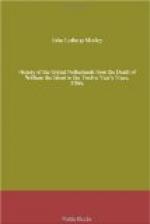condition was most forlorn. Was it strange that
the proud Earl should be fretting his heart away when
such golden chances were eluding his grasp? He
would “creep upon the ground,” he said,
as far as his hands and knees would carry him, to
have a good peace for her Majesty, but his care was
to have a peace indeed, and not a show of it.
It was the cue of Holland and England to fight before
they could expect to deal upon favourable terms with
their enemy. He was quick enough to see that
his false colleagues at home were playing into the
enemy’s hands. Victory was what was wanted;
victory the Earl pledged himself, if properly seconded,
to obtain; and, braggart though he was, it is by no
means impossible that he might have redeemed his pledge.
“If her Majesty will use her advantage,”
he said, “she shall bring the King, and especially
this Prince of Parma, to seek peace in other sort
than by way of merchants.” Of courage and
confidence the governor had no lack. Whether
he was capable of outgeneralling Alexander Farnese
or no, will be better seen, perhaps, in subsequent
chapters; but there is no doubt that he was reasonable
enough in thinking, at that juncture, that a hard campaign
rather than a “merchant’s brokerage”
was required to obtain an honourable peace.
Lofty, indeed, was the scorn of the aristocratic Leicester
that “merchants and pedlars should be paltering
in so weighty a cause,” and daring to send him
a dish of plums when he was hoping half a dozen regiments
from the Queen; and a sorry business, in truth, the
pedlars had made of it.
Never had there been a more delusive diplomacy, and
it was natural that the lieutenant-general abroad
and the statesman at home should be sad and indignant,
seeing England drifting to utter shipwreck while pursuing
that phantom of a pacific haven. Had Walsingham
and himself tampered with the enemy, as some counsellors
he could name had done, Leicester asserted that the
gallows would be thought too good for them; and yet
he hoped he might be hanged if the whole Spanish faction
in England could procure for the Queen a peace fit
for her to accept.
Certainly it was quite impossible for the Spanish-faction
to bring about a peace. No human power could
bring it about. Even if England had been willing
and able to surrender Holland, bound hand and foot,
to Philip, even then she could only have obtained
a hollow armistice. Philip had sworn in his
inmost soul the conquest of England and the dethronement
of Elizabeth. His heart was fixed. It
was only by the subjugation of England that he hoped
to recover the Netherlands. England was to be
his stepping-stone to Holland. The invasion was
slowly but steadily maturing, and nothing could have
diverted the King from his great purpose. In
the very midst of all these plots and counterplots,
Bodmans and Grafignis, English geldings and Irish
greyhounds, dishes of plums and autograph letters
of her Majesty and his Highness, the Prince was deliberately




